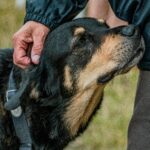Rottweiler puppies, like all breeds, have their own unique behavior patterns. As a responsible pet owner, you need to know how to deal with any behavior problems that may come up. Here are some common Rottweiler puppy behavior issues and solutions to help you raise a well-behaved companion.
RELATED TOPICS:
- Raising a Happy and Well-Behaved 8 Week Old Rottweiler
- Understanding and Managing 3-Year-Old Rottweiler Behavior
- 9 Month Old Rottweiler Behavior: Tips and Training
- Managing Aggressive Rottweiler Behavior: Understanding the Causes
- Chewing: Rottweiler puppies are naturally curious and love to explore their environment. This often leads to chewing on household items, shoes, and furniture. To prevent this behavior, provide your puppy with plenty of chew toys and redirect their attention when they chew on something they shouldn’t.
- Jumping: Rottweilers are known for being energetic and playful, which can result in them jumping on people and furniture. To stop this behavior, consistently teach your puppy the “sit” command and reward them when they obey. Also, keep in mind that young puppies have a lot of energy, and providing them with enough exercise can help reduce this behavior.
- Barking: Rottweilers are protective and may bark excessively when they sense a threat. To prevent excessive barking, socialize your puppy early on and teach them to respond to the “quiet” command. Proper training will help your puppy understand when it is appropriate to bark and when it is not.
- Separation Anxiety: Rottweilers have a strong attachment to their owners and may experience separation anxiety when left alone. To prevent this behavior, gradually increase the amount of time your puppy spends alone and provide them with plenty of toys and bones to keep them occupied.
- Aggression: Rottweilers have a strong prey drive and may show aggression toward smaller animals. To prevent this behavior, socialize your puppy early on and train them to respond to the “leave it” command.
How Long Does Rottweiler Puppy Stage Last?
Rottweiler puppies are known for their adorable looks and playful personalities, but have you ever wondered how long the puppy stage lasts? Understanding the different developmental stages of a Rottweiler puppy can help you provide the best care and training for your new companion.
The puppy stage can be broken down into three main phases: the neonatal phase, the socialization phase, and the juvenile phase.
The neonatal phase, which lasts from birth to about 2 weeks of age, is a critical time for the development of basic physical and emotional needs. During this phase, puppies are completely dependent on their mother for survival and cannot yet see, hear, or walk.
The socialization phase, which lasts from 3 to 12 weeks of age, is a crucial time for your puppy to learn and develop social skills. During this phase, your puppy will start to interact with other dogs and humans and will begin to explore its surroundings. It is important to expose your puppy to a variety of people, animals, and environments during this phase, as this will help to prevent fear and aggression later in life.
The juvenile phase, which lasts from 3 to 6 months, is a time of rapid growth and development. Your puppy will continue to grow and mature, both physically and emotionally, during this phase. This is the time when basic obedience training can begin, as your puppy’s attention span and ability to learn will have greatly improved from the previous phase.
It is important to note that the duration of each phase may vary depending on the individual puppy, and not all puppies will develop at the same rate. However, generally, the puppy stage for a Rottweiler can last from birth to about 6 months of age.
At What Age Do Rottweilers Start Barking?
Rottweilers are known for their deep, commanding bark. However, at what age do Rottweilers start barking? Rottweiler puppies generally start to bark at around 4 to 6 months of age, as their vocal cords and ability to communicate develop.
However, it is important to note that some Rottweiler puppies may start barking earlier or later depending on individual development. As a protective breed, Rottweilers may bark to alert their owners of potential danger, and it is important to train them to bark only when necessary.
Training your Rottweiler puppy to respond to the “quiet” command can help prevent excessive barking and ensure that your dog’s barking is controlled.
Additionally, socialization and exposure to different environments and people can help prevent fear and anxiety-related barking.
Do Rottweilers Need A Lot Of Attention?
Rottweilers are known for being loyal and protective companions, and they can make great family pets. However, when it comes to attention, do Rottweilers need a lot of it? The answer is that it depends on the individual dog. Rottweilers are a working breed, and they have a strong desire to be with their family and to please their owners, which can make them crave attention and interaction. They are known for their affection and loyalty, and they can be very attentive to their owners.
That being said, Rottweilers also have a strong independent streak, and they can do well with moderate amounts of attention. They do not require constant attention and can be content with a moderate amount of interaction with their owners. It is important to give your Rottweiler plenty of exercises and mental stimulation, as well as provide them with plenty of toys and bones to keep them occupied when you are not able to give them attention.
Final Thoughts About Common Rottweiler Puppy Behavior Issues and Solutions
In conclusion, Rottweiler puppies, like all breeds, have their own unique behavior patterns that can be addressed with proper training and socialization. Common Rottweiler puppy behavior issues such as chewing, jumping, barking, separation anxiety, and aggression can all be prevented with the right approach.
By providing your Rottweiler puppy with plenty of chew toys, training basic commands like “sit” and “quiet,” and socializing them early on, you can help to prevent these issues and raise a well-behaved companion.
Remember to be patient and consistent in your training, and if you have any concerns about your puppy’s behavior, it is always best to consult with a professional trainer or behaviorist for guidance.







